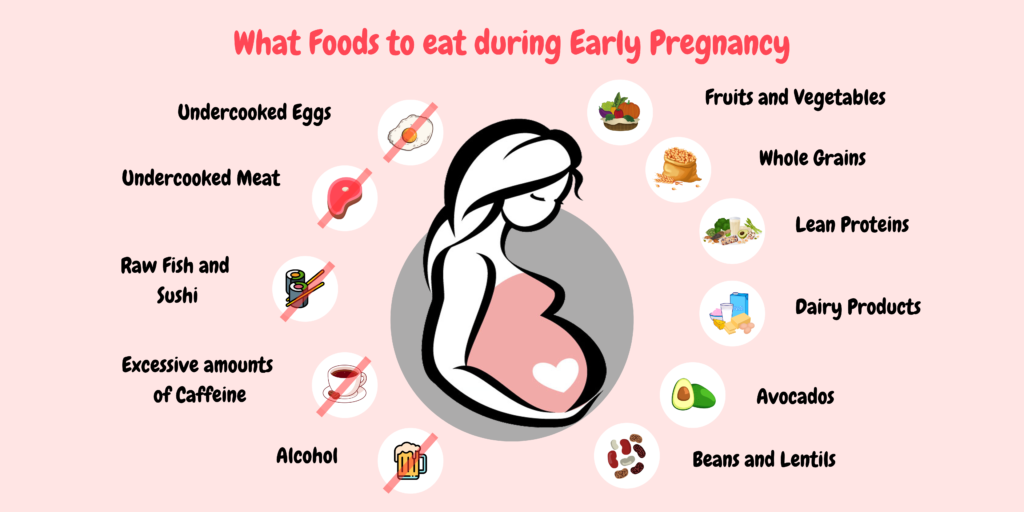Safe Foods during early Pregnancy
During early pregnancy, it’s important to focus on a balanced diet that supports both maternal health and fetal development. Safe foods include a variety of fruits and vegetables, whole grains, lean proteins, and healthy fats. Go for pasteurized dairy products to ensure safety against harmful bacteria, and incorporate cooked meats and fish low in mercury, such as salmon and shrimp. Iron-rich foods like spinach, lentils, and fortified cereals are beneficial, as well as foods high in folate, such as beans and citrus fruits, to aid in fetal development. Staying hydrated with plenty of water is also crucial. Avoiding raw or undercooked foods, unpasteurized products.
On this page

1. Which foods are good for early pregnancy?
In early pregnancy, it’s important to focus on nutrient-rich foods. Here are some good options:
Fruits and Vegetables: Fruits and vegetables are important during early pregnancy, providing essential vitamins, minerals, and fiber. Here are some great choices:
Fruits:
- Berries: Rich in antioxidants, vitamins C and K, and fiber.
- Citrus Fruits: Oranges, grapefruits, and lemons are high in vitamin C and folate.
- Bananas: A good source of potassium and vitamin B6, which can help with nausea.
- Avocados: Packed with healthy fats, folate, and potassium.
- Apples: High in fiber and vitamin C.
- Mangoes: Rich in vitamins A and C, and can satisfy sweet cravings.
Vegetables:
- Leafy Greens: Spinach, kale, and Swiss chard are high in folate, iron, and calcium.
- Broccoli: A great source of fiber, vitamins C and K, and folate.
- Carrots: Rich in beta-carotene, which the body converts to vitamin A.
- Bell Peppers: High in vitamins A and C; colourful and nutritious.
- Sweet Potatoes: Packed with vitamins A and C, fiber, and complex carbohydrates.
- Peas: Good sources of protein, fiber, and essential vitamins.
Incorporating a variety of these fruits and vegetables into your diet can help ensure you receive the necessary nutrients for a healthy pregnancy.
Whole Grains:
Whole grains are an important part of a healthy diet during early pregnancy, providing essential nutrients and energy. Here are some whole grains to consider:
- Brown Rice: A good source of fiber, B vitamins, and minerals like magnesium and iron.
- Quinoa: A complete protein containing all nine essential amino acids, along with fiber, iron, and magnesium.
- Whole Wheat Bread: Provides fiber, B vitamins, and important minerals; go for varieties with minimal added sugars.
- Oats: Rich in fiber, particularly beta-glucan, which can help with cholesterol levels; also a good source of iron.
- Barley: High in fiber and beneficial for digestive health, as well as being a good source of vitamins and minerals.
- Millet: Gluten-free and rich in magnesium, millet also provides B vitamins and antioxidants.
Incorporating these whole grains into your meals can help maintain energy levels, support digestive health, and provide vital nutrients for both you and your developing baby.
Lean Proteins:
Lean proteins are essential during early pregnancy, as they support fetal growth and development. Here are some excellent sources of lean protein to include in your diet:
- Chicken and Turkey: Skinless poultry is low in fat and high in protein, making it a great choice.
- Fish: Opt for low-mercury options like salmon, and shrimp, which provide omega-3 fatty acids beneficial for fetal brain development.
- Eggs: A versatile source of protein, eggs also contain choline, which supports brain development.
- Tofu and Tempeh: Great plant-based protein options that are also rich in iron and calcium.
- Legumes: Beans, lentils, and chickpeas are high in protein and fiber, as well as essential vitamins and minerals.
- Greek Yogurt: Higher in protein than regular yogurt, it’s also a good source of calcium and probiotics.
Including a variety of these lean protein sources in your meals can help ensure you meet your nutritional needs during this crucial time.
Dairy Products:
Dairy products are an important part of a balanced diet during early pregnancy. Here are some beneficial dairy options:
- Milk: A rich source of calcium, vitamin D, and protein, milk supports bone health for both you and your baby.
- Yogurt: Especially Greek yogurt, which is high in protein and probiotics that can aid digestion.
- Cheese: Provides calcium and protein; choose varieties like mozzarella, cheddar, or feta. Ensure that cheese is made from pasteurized milk to avoid harmful bacteria.
- Cottage Cheese: High in protein and calcium, it can be a versatile addition to meals or snacks.
- Fortified Dairy Alternatives: If you’re lactose intolerant or prefer plant-based options, look for fortified almond, soy, or oat milk that contains calcium and vitamin D.
Including these dairy products in your diet can help ensure you get the necessary nutrients, particularly calcium and protein, which are vital for your baby’s development.
Healthy Fats:
Healthy fats play a crucial role in early pregnancy, supporting fetal brain development and overall health. Here are some great sources of healthy fats to include in your diet:
- Avocados: Rich in monounsaturated fats, fiber, and folate, avocados are great for heart health and fetal development.
- Nuts: Almonds, walnuts, and pistachios are packed with healthy fats, protein, and essential vitamins. Walnuts, in particular, are high in omega-3 fatty acids.
- Seeds: Chia seeds, flaxseeds, and pumpkin seeds provide omega-3s, fiber, and various nutrients. They can be added to smoothies, yogurt, or oatmeal.
- Olive Oil: Olive oil is great for cooking or as a salad dressing. It also has anti-inflammatory properties.
- Fatty Fish: Salmon, mackerel, and sardines are excellent sources of omega-3 fatty acids, which are vital for brain and eye development. Choose low-mercury options.
- Nut Butters: Almond or peanut butter provides protein, healthy fats, and essential nutrients.
Incorporating these healthy fats into your meals can help provide the necessary nutrients for you and your developing baby, promoting overall health during pregnancy.
Eggs:
A great source of protein and choline, which is important for fetal brain development. Eggs are an excellent source of complete protein, providing all the essential amino acids needed for growth and development.
Legumes:
Legumes like beans, lentils, and chickpeas are great sources of plant-based protein, crucial for fetal growth and development. They provide dietary fiber, which can help prevent constipation. Legumes are rich in important vitamins and minerals, including iron, folate, magnesium, and potassium. Folate is particularly vital in early pregnancy for preventing neural tube defects.
Fortified Foods:
Look for cereals and breads fortified with essential vitamins and minerals. Many fortified foods are enriched with important vitamins and minerals, such as folic acid, iron, calcium, and vitamin D. These nutrients are crucial for fetal development and maternal health. Incorporating fortified foods into your diet can help ensure you’re getting the essential nutrients required for a healthy pregnancy.
2. Which foods should be avoided in early pregnancy?
During early pregnancy, certain foods should be avoided to reduce the risk of foodborne illnesses and protect both maternal and fetal health. Here are following foods to avoid:
- Raw or Undercooked Meat: This includes beef, poultry, and pork, as they may contain harmful bacteria or parasites. Always ensure meat is thoroughly cooked.
- Raw Fish and Shellfish: Avoid sushi made with raw fish, as well as raw oysters and clams, which can contain harmful bacteria and viruses.
- High-Mercury Fish: Fish like shark, swordfish, king mackerel, and tilefish should be avoided due to high mercury levels, which can affect fetal brain development.
- Unpasteurized Dairy Products: These can contain harmful bacteria like Listeria, so stick to pasteurized milk, cheese, and yogurt.
- Raw Eggs: Avoid raw or lightly cooked eggs, as they can carry Salmonella. This includes foods like homemade mayonnaise and certain dressings.
- Processed Meats: Hot dogs, and other processed meats can be contaminated with Listeria. If consumed, ensure they are heated until steaming.
- Certain Soft Cheeses: Avoid soft cheeses like brie and feta unless they are made from pasteurized milk.
- Caffeine and Alcohol: Limit caffeine intake and avoid alcohol, as both can pose risks to fetal development.
- Certain Herbal Teas and Supplements: Some herbal products may not be safe during pregnancy, so it’s best to consult with a healthcare provider.
By avoiding these foods, you can help ensure a healthier pregnancy for both you and your baby.

